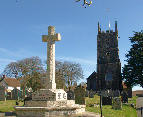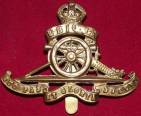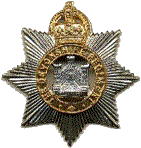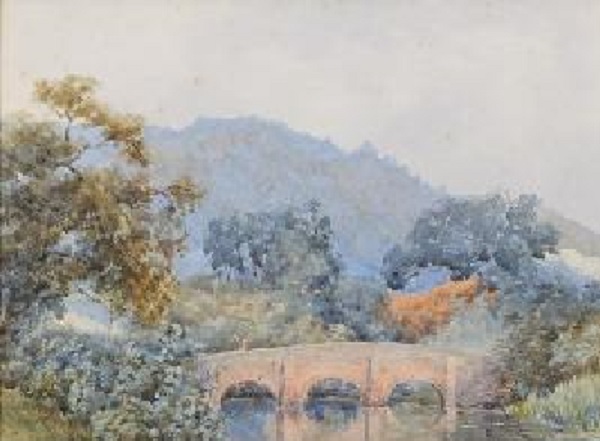
|
| HOME PAGE |
| MEMORIAL CROSS |
| HISTORY of the CROSS |
| ROLL of HONOUR |
| LINKS |
 
Lt.Col. Gerald D'Arragon Alexander 1859-1938 Royal Artillery Recruiting Officer for N.Devon 1914-18
Funeral of Lieut.Col. G.D'A Alexander Work for Parish 'The death occurred on Saturday of Lieut.Col. G.D'A. Alexander of Townsend House, Winkleigh, who has been in ill health for many years. He was 79. Son of the late General Sir James Alexander, of Westerton, Bridge of Allan, he was commissioned in the Royal Artillery in 1878 and at first served in Ireland and at Home Stations. He was appointed instructor in gunnery at Plymouth in 1893. He served in India, Mauritius and Malta, where he contacted fever, which indirectly led to his retirement through ill-health in 1904. He had lived in Winkleigh since 1908 except during the war when he acted as recruiting officer for the North Devon area. During his 30 years in Winkleigh he had rendered valuable help and assistance for the welfare of the village and at one time had occupied 17 different posts. He was a JP, treasurer for the Nursing Association Choral Society, and for the Orchestral Society. He was Chairman of the local Conservative Association. The funeral, which took place on Tuesday, was largely attended. The service was held at the parish church when the vicar (Rev. T. A. Parkes) officiated. The grave was beautifully lined with moss and choice flowers. The bearers were ex-servicemen: Messrs. T.J.Knight, T.Lugg, F.Letheren, A.W. Mitchell, G.Lugg and H.Mitchell.' Col. Alexander's father, Major-General Sir James Edward Alexander had a most distinguished military career. By some contrast with his father, Col. Alexander's career in the army was an example of the slow rate of promotion prior to 1914. Educated at Cheltenham College and Sandhurst, he was commissioned Lieutenant on 18th December 1878, but it took eight years before he was promoted to Captain on 1st October 1886. A further 10 years elapsed before he became Major on 2nd October 1896. Meanwhile, on Wednesday 18th January 1893 Captain Alexander was married in St. Andrew's Church, Plymouth to Beatrice Whipple, the daughter of Dr. Connell Whipple of Plymouth: the 'Western Morning News' reported it fully the following day. The wedding was apparently a very fashionanable and popular affair, no less than three carriages each pulled by two greys bringing the bridal party and the immediate relatives to the ceremony. The general public crowded in to fill the church, and so great was the enthusiasm to see the bride and her father walk up to the alter that much to the general consternation of the congregation and the vicar women were standing on the chuch pews to get a better view of the proceedings, a shocking state of affairs! The 'News' reported that the pair received over 200 wedding presents, 'beautiful and costly'. From the rank of Major promotion was via staff college examination, achieved more rapidly with his appointment to Lt.Colonel on 22nd April 1904. Surprisingly, Col. Alexander then took half-pay (part-retirement but on the immediate reserve list) prior to his full retirement from the army in 1908. This of course was not a willing course of action, but as we know resulted from the attack of fever which badly affected him while serving with the Royal Artillery in Malta. Thenceforth he devoted himself to civic activities, first renting and then buying Townsend House. During the war, it was necessary for him to live in Barnstaple, acting as the recruiting officer for the whole of North Devon, but following the armistice he returned as soon as possible to Townsend House. He had been able to buy the house during the war, following the death of his landlord, on 27th October 1916. He paid £900 for it at auction, while the adjoining Townsend Farm was sold to Mrs. Johnson for £2050. The local Devon newspapers of 100 years ago reveal much of Col. Alexander's work and life in Winkleigh. As recruiting officer at the start of the war he played a very important part persuading as many young men as possible to volunteer. There were three phases in which men were enlisted into the army generally throughout the country: Phase 1: The voluntary phase, August 1914 to the opening of the Derby scheme in October 1915, and indeed during the period of the Derby Scheme itself which closed on 15th December 1915. Phase 2: The Derby Scheme, first announced to the country on 15th October 1915, comprised a personal canvass of every man between the ages of eighteen and forty-one on the basis of the National Register. Each man was asked either to join at once or attest, and committees were set up in every locality. In Winkleigh, Col. Alexander was in the forefront. Single men and married men formed two groups: each were sub-divided into a further twenty-three groups according to age, to be called up in strict order, starting with the single men aged 19, and the married men to be called only after the single men had all been enlisted. Tribunals were set up for those seeking exemption from attestation or postponement on grounds of special hardship or essential war-work. Those who attested could still, in theory, choose their branch of the army in which to serve although pressure was brought on as many as possible to serve in the infantry. The scheme was no more than a partial success, as many argued that since three million men had already come forward, 75% over and above the numbers Kitchener had called for, there was no need for further recruitment. Fewer than half those available had attested, the Tribunals had been too liberal in granting exemptions, and more men were indeed needed when the Derby scheme was finally closed on 15th December 1915. Phase 3: Conscription. As a result, the conscription bill affecting single men was introduced into the House of Commons on 5th January 1916, becoming law on 27th and in March 1916 the youngest group of married men who had attested were of necessity also called up. A second military service bill, introduced on 3rd May 1916, became law on 25th May, and extended the liability for military service to all men between eighteen and forty-one, both married and single. Col. Alexander was keenly involved throughout. His main idea during phase 1 was to organise a series of recruitment marches throughout North Devon, calling at villages and towns along the way to 'beat the drum' and inspire young men to come forward. Such recruiting methods were common during the Napoleonic wars and indeed go as far back as Elizabethan times, witness Falstaff's little 'army' recruited in Shakespeare's Henry IV, part 2. Col. Alexander called on the 3rd Battalion of the Devonshire regiment, with the depot in Exeter barracks, to organise the marches. The 3rd Battalion was the reserve and training battalion, made up largely of recruits with a smattering of veterans convalescing from the battles of 1914 and 1st Ypres, 1915. For the young soldiers for whom the army was still a novelty the marches offered an exciting variation to normal routine, since they were fêted and often feasted in the villages through which they passed. On 14th Janury 1915 the Western Times reported that Col. Alexander took part in a three day march, including the 3rd Battalion band, which passed through South Molton, Lapford, Witheridge, Yeoford, Copplestone and Morchard Bishop where the men were billeted. Tea was served in the school, where in the evening there was a 'smoking concert' to entertain the 'boys'. Two more days of marching brought the parade back to South Molton. The second recruiting march, reported on 16th February, was a more elaborate affair, with the men transported in char-a-bancs, accompanied by a full band and bearing numerous flags and colourful decorations. 50 men of the 3rd Devons, all of whom had served at the front were in the vanguard. At Coldridge 5 men were recruited, but in Winkleigh no-one stepped forward. The Western Times reported that the village had already contributed 45 men while 5 who had tried to volunteer had been rejected, amounting to a total of 5% of the male population enlisted. Apparently the farmers in Winkleigh still held back. The village made an enthusiastic occasion of the whole event, with a dinner in the schoolroom and the band playing in the Square. Next morning the parade drove on to Burrington (1 recruit) and High Bickerton for tea, ending at Torrington for supper in the market hall including fruit, cigarettes and chocolates raised by subscription. The final day saw a big recruiting drive in Torrington and the whole affair ended with a concert. By June 1915 a special effort was being made to persuade the farmers to part with their labour, and indeed their own sons. Col. Alexander's fourth recruiting march included 25 Devon Regiment recruits, including some walking wounded, and 52 boys from Devon County Schools Officers Training Corps contingents. The area covered included Morte Hoe, Woolacombe and Ilfracombe. From the start of the war Col. Alexander was anxious to promote the idea of virile youth eagerly rushing to the colours, and disappointed with those hung back. On 15th December 1914 the 'Western Times' reported his letter to the Torrington Rural District Council : A letter was read from Col. Alexander, recruiting officer for North Devon, stating that it had been brought to his notice that there were a number of young men between the ages of 19 and 38, who were at present working the roads. He asked the Council to use its influence to persuade these men to join the new armies now being formed for the duration of the war. He had personally seen young men breaking stones by the roadside when they ought to be serving their country, now that so many were wanted for reinforcements on the Continent. Such work as they were doing could he quite as well performed by men from 40 to 60 years of age. The discussion revealed the attitude of the rural governing class to the working man: Col. Moore-Stevens said he wished the Germans would drop some bombs on this country, and the young men would then realise the situation. He strongly criticised the action of these young rogues who remained at home by their fires, with every comfort, and would not go and help those poor fellows who were doing the fighting. They ought to be ashamed of themselves. The sooner they went, and more men that were available, the sooner would the war be over, and the less costly it would be. It was in the interest of everybody to see that the young men referred to enlisted. He mentioned that a young man recently applied to him for work, and when he said his age was only 25 he (the Colonel) told him the best place for him to go was to the nearest recruiting officer. The man replied that 'if they came and took him he would go then'. He (the Colonel) said that he wanted men badly, but he would not take one who could of service to his country. If the men of that district only went to the East Coast, and saw what was happening there, he thought it would make them change their minds. — It was understood that the Clerk to the Council's suggestion will be carried out. Rumours were rife, 'fake news' of German atrocities in Belgium, the 'Angels of Mons', Russian allied soldiers in London with snow on their boots are all well known. The Western Times was not immune - on the same day in December 1914 appeared a headline: The Kaiser Proposes to Spare Devon and Cornwall: a map of "Future Europe," found in the pocket of a dead German officer, is reproduced by a Petrograd newspaper. According to this map, only Devon and Cornwall will be spared to the English, the rest of England being a German colony. Scotland and Ireland are marked as separate kingdoms. During the three months of the Derby Scheme, October to December 1915, recruiting ceased to be a matter of bands and marches and became a more serious business, impacting the whole population, with ever more pressure put on those eligible to enlist. With the end of the Derby scheme came conscription, and as a J.P. Col. Alexander was involved in tribunals regulating the affairs of those eligible to join up. At the beginning it was possible for an employer to find, if he was able to do so, a 'substitute' for an employee he did not wish to lose, often an open opportunity for abuse. The system caused endless problems for the magistrates who had to approve the substitute scheme. A man had first to appear for a medical examination, and a representative from the army had to be present to make the case for the military. On 5th October 1916 for example Col. Alexander presided at a tribunal: In the case of Wm. Watts, 27, farm horseman of Umberleigh, passed B1, Mr. B. T. James appearing for the employer, the Tribunal was of the opinion that it would require an especially good man as a substitute, and the Chairman asked Col. Alexander if he could tell them anything of the position of the substitute scheme — Col. Alexander said he had very few names — about 25 — mostly farm labourers and carpenters. He had farm horsemen on the list, and one cattleman. Adjourned sine die, and if the military are able to provide an efficient man for the post the case will come up again. Subsequently, in another case, Mr. A. E. Hopper mentioned that Col. Alexander had told him that substitution would have to remain in abeyance until they knew the effect of the new Army Order on farm labour. The Tribunal adjourned several cases to see if substitutes could be found. When the substitution scheme died out, deferment was often pleaded by those conscripted. Col. Alexander became judge and jury on the J.P. Bench. On 20th February 1917, for example, Col. Alexander deferred conscription for an assistant vetinery surgeon working for the Barnstaple Union Agricultual Association. Earlier, on 20th July 1916 he is reported as hearing a whole batch of military appeals. A typical example was: Alfred Calo, insurance agent, whose case had been adjourned from last week, produced a medical certificate from Dr. Manning stating that applicant was "Unfit. For nine years had his shoulder joint slipping out, and he had been operated on, but not cured." The certificate was counter-signed by Colonel Alexander, recruiting officer for North Devon. Men excused conscription were 'badged' to ensure they were not recalled. This could lead to endless attempts to avoid millitary service while at the same time leaving agriculture for better wages elsewhere. On 20th July 1916 the Western Times reported: Permission had been given for the case of Thomas Beer, wheelwright, Atherington, to be reopened on the grounds of fresh facts. It was stated the man had been badged for munition work. The agriultural representative said he had been given to understand this man was indispensible to the farmers. The information from the Board of Agriculture was that it was not allowable to get men away from agriculture and then badge them. Lieut. Stirling (military representative) protested against this juggling to keep men out of the Army. This was a case in which they had an extraordinary list of people who said they could not do without this wheelwright, and who then went on to get starred in another occupation. Beer appeal dismissed. In the case Alfred Milton, 18, single, employed on a farm by his father at Atherington, tbe military appealed against conditional exemption granted by the local Tribunal. Although coming to this decision, the local Tribunal agreed with the military that this young man ought to go, but owing to another son John, about 25, single, having got badged and gone, they could not leave the farm without the labour of the son. The Chairman: This other man has gone on munitions? — The Clerk (Mr. Brewer): Gone into the woods at Yarnecombe, for Morrisey and Co. The father said John left him for bigger wages. He was now having 9s a day and overtime, making some weeks £3.3.00 no doubt, and he could not afford to pay half it. Lieut Stirling characterised it as perfectly monstrous that whilst numbers of young men were getting killed in their country's defence, other single young men changed their occupation to get badged and stay home and get nearly £4 a week. Mr. Metherell said he spoke to the War Agricultural Committee at Exeter about young men going from agricultural work to timber work and getting badged, and Mr. Home said they did not intend to allow it. Col.Alexander dealt with a great variety of cases. On one day, 20 July 1916 for example he was dealing with a chauffeur, piano tuner, forestry worker, a fruit grower at Combe Martin who refused to allow girls on his farm to replace the men, a road labourer, horseman, insurance agent, thatcher and grocer - many bringing solicitors to represent their case for being badged, with a variety of verdicts. At the same time as dealing with war work, Col.Alexander's work as a J.P. continued. He dealt with a wide variety of rural cases, drunken behaviour, abusive language, violence - sometimes all three together. On 1st January 1915 he is reported dealing with a road mending contractor who refused to allow his three sons to be interviewed by a Sgt. Recruiter from 1st Devons attempting to persuade young men to join. Riding a bike without lights would incur a 10/- penalty - often that was a week's wages. There were more serious cases, child abuse and neglect for example. On 10th May 1918 we read of a particularly shocking case from North Tawton. The father and grandmother appear to us to have got off very leniently. In the wider community Col. Alexander seemed everywhere involved. He was Chairman of the local Conservative Association and as such was keenly involved in the 1910 general election fought on the issue of Lloyd George's Liberal budget to pay for the new proposed old age pension, which had been rejected by the House of Lords. Asquith's government called for a Parliament Act to prevent the Lords from blocking legislation. The election result was a draw between Liberals and Conservatives but with the help of Labour and the Irish Parliamentary party Asquith again became Prime Minister. The Lords gave way and the budget was passed. Winkleigh elected a Liberal member despite a Conservative rally in the Square on 12th December, supported by Col. Alexander. On 13th December the Western Times reported: We congratulate our local Liberal association on the work they have done, and for the effort they put into the fight. Notably it must be mentioned Mr. K. Lane, the local Chairman who was most assiduous in his efforts; Mr. Luxton (Chairman Committee). And Mr. H. G. Isaac (General Secretary to Committee). The local Conservatives must be mentioned, who worked hard for their cause. Those most involved in their efforts were Col. Alexander (Chairman of Committee), Mr. James, and Mr. E. Chambers. Col.Alexander chaired the Winkleigh Nursing Association, acted as the sports referee for the Winkleigh Fair (held in 1910 at Greysbridge Farm), served as Chair of the local branch of the Devon Patriotic Fund, organised the collection of funds for the local war hospitals and the daily collection of eggs for the wounded, often appeared as the guest of honour at local school functions, and much more. He left Barnstaple in February 1918 to return to live in Winkleigh where he was immediately elected Church Warden. One of Col. Alexander's first activities after the war was to promote as far as possible the swift demobilisation of the Winkleigh men from the armed forces, through the Barnstaple and Devon Advisory Committee on demobilisation. For the most part he could do little, but for some categories, for example the labour corps, it was possible to apply for faster demobilisation on the grounds of the necessity of returning farm workers to their pre-war occupations. By April 1919 52 men recommended by the Committee had returned home, leaving a further 28 still to be demobilised. In all, by that date, 2,300 men had been demobilised in North Devon. Many difficult questions remained to be sorted out - for example the problem for farmers when a former employee who had been promised a job now demanded more money, or even decided to find other work. There was little time for hobbies but he was a talented amateur watercolour artist: quite recently a painting of his came up for auction in Exeter of 'The Mole, Dorking, a River View. 
Col. Alexander was an enthusiastic promoter of the fund that financed the war memorial. Although a churchwarden and an enthusiastic supporter of all church affairs, he argued the case for placing the stone cross in the Square, as a more satisfying compromise that would satisfy both the Nonconformist and the Church of England practitioners. The vicar however stood firm: the full story is written in the section 'The History of the Cross'. In addition to all his work Col. Alexander performed an inestimable service to the memory of the fallen and to those who returned to the village - first the compiling of a complete list of all those who had served and then the personal inscription, as his own artistic handiwork, of the illuminated scroll that still hangs proudly in the church. It is this scroll that the late David Purnell, who did so much to design and create this website, was able to reproduce as our home page. Indeed, the Winkleigh Heroes site itself is a testimony to the memory of Col. Alexander and all we owe to him. His memory lives on: without all he did for Winkleigh our history of the contribution made by the 27 men who gave their lives and the 114 men and 2 ladies who served and survived would have been lost forever. 3rd April 2018 |
|---|
| [Top] | Back to Roll of Honour |

Click on an image for a larger picture |
